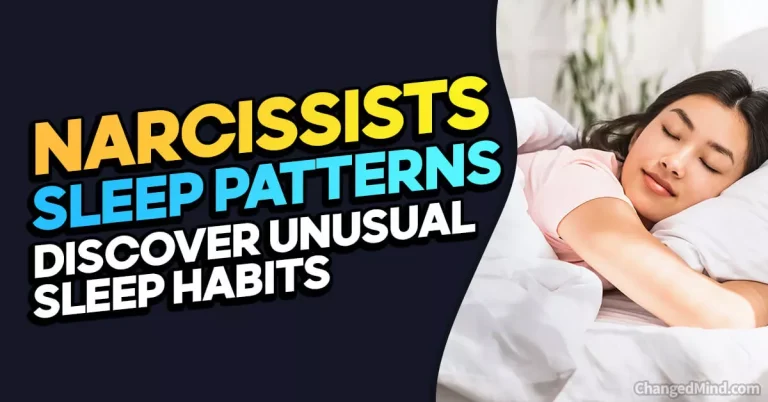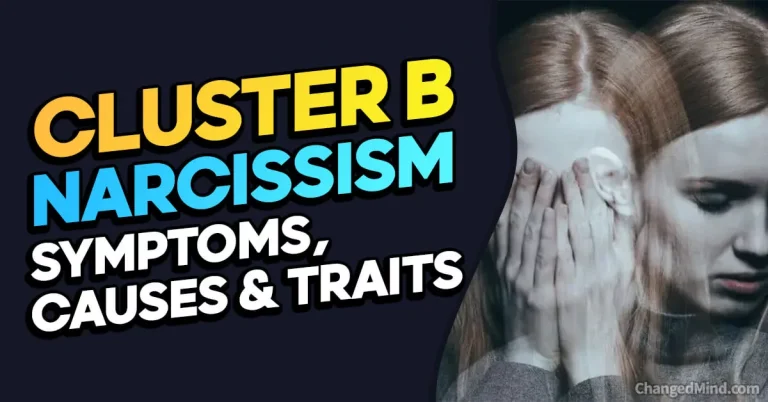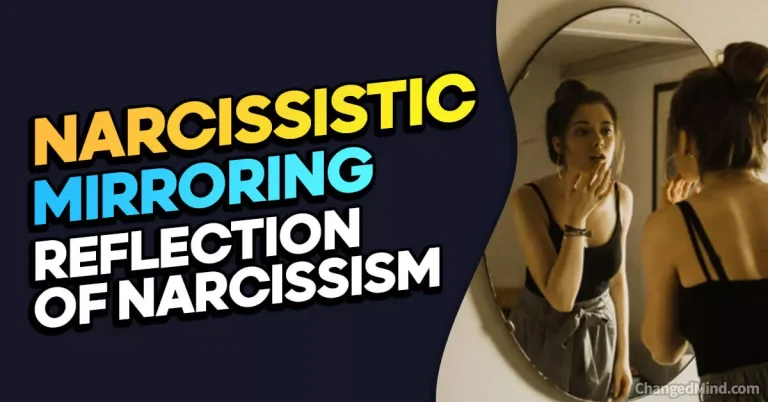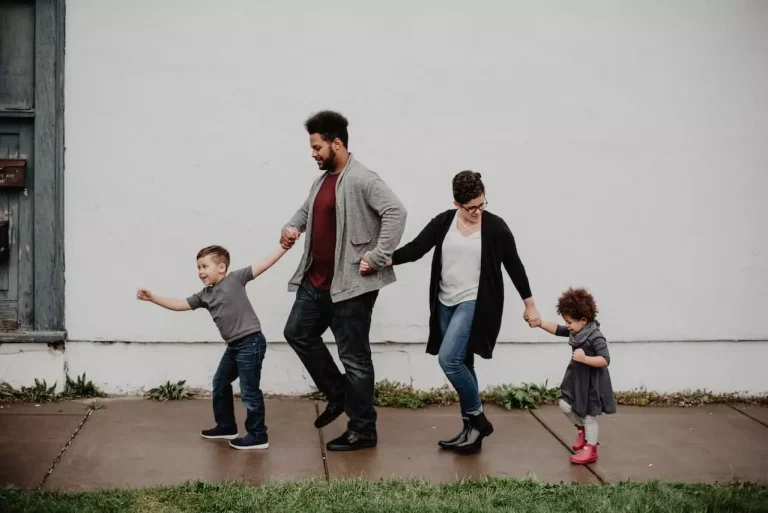Welcome to the intriguing world of narcissism, where self-importance and self-admiration reign supreme!
Picture this: a narcissist gliding through life without a care in the world, but wait…do they ever feel guilt? Today, we embark on a journey to uncover the truth behind this burning question. Brace yourself for an enlightening exploration that will challenge your preconceptions and provide insights into the intriguing minds of narcissists.
So, do narcissists feel guilt? Well, the short answer is…yes and no. But hold on tight, because there’s so much more to the story!
Short Answer: Yes, narcissists may display guilt, but it often comes with a catch. Delve deeper into this fascinating topic to understand the intricacies of guilt in the narcissistic realm. Discover why their empathy switch is not quite like the rest of us, and explore the impact of their emotional landscape on relationships.
Get ready to unravel the complex web of narcissistic behavior and dive into the depths of their guilt (or lack thereof).
Join us as we shed light on this captivating subject that promises surprises at every turn. Let’s dive in and uncover the truth about whether narcissists truly feel guilt.
Understanding Narcissism
Now that we have a basic understanding of narcissism, let’s dig a little deeper into the characteristics that define Narcissistic Personality Disorder (NPD). Buckle up, because it’s about to get interesting!
Definition and Key Traits of Narcissistic Personality Disorder (NPD)
NPD is like a masterclass in self-centeredness. Individuals with NPD exhibit a pattern of grandiosity, a sense of superiority, and an intense need for admiration. They believe they are special, unique, and more deserving of success and recognition than anyone else.
Expert Says
Laurie Hollman, PhD
Licensed Psychoanalyst, Choosing Therapy | Author, “Are You Living with a Narcissist?”.

Here are some key traits commonly associated with narcissistic personality disorder:
- Grandiose Sense of Self: Narcissists have an inflated sense of self-importance. They believe they are exceptional beings who deserve special treatment and admiration from others.
- Preoccupation with Fantasies of Success: Narcissists often daydream about unlimited power, beauty, or success. They believe they are destined for greatness and expect others to acknowledge and fulfill their grandiose visions.
- Sense of Entitlement: Narcissists possess an unwavering belief that they deserve preferential treatment. They expect others to meet their needs without question and feel entitled to special privileges.
- Lack of Empathy: Empathy is not a narcissist’s strong suit. They struggle to understand or relate to the emotions and experiences of others. Instead, they prioritize their own desires and remain indifferent to the impact of their actions on those around them.
- Manipulative and Controlling Behaviors: Narcissists excel in manipulation and control. They are skilled at exploiting others to meet their needs, whether it be through emotional manipulation, gaslighting, or playing mind games.
Narcissists in Relationships
When it comes to relationships, narcissists bring a whole new level of drama and confusion. Their manipulative and controlling behaviors can turn any love story into a roller coaster ride from hell. Here are a few behaviors you might encounter when dealing with a narcissist:
- Love-Bombing: At the beginning of a relationship, narcissists often shower their partners with excessive attention and affection. They make you feel like the most important person in the world. It’s like being in a romantic comedy, but with a twist.
- Gaslighting: Gaslighting is a tactic narcissists use to make you question your own sanity. They twist your reality, manipulate the facts, and make you doubt your own perception of events. It’s like they’re playing a masterful game of “Guess Who’s the Crazy One?”
- Emotional Manipulation: Narcissists are masters at tugging at your heartstrings to get what they want. They know exactly which emotional buttons to push to make you dance to their tune. It’s like they have a PhD in Emotional Puppetry.
- Control and Dominance: Narcissists thrive on control. They want to be the puppeteer pulling the strings, dictating every aspect of the relationship. It’s like being trapped in a never-ending game of “Follow the Narcissist’s Rules.”
Navigating a relationship with a narcissist can be emotionally draining and confusing. It’s important to recognize the signs and set boundaries to protect your well-being. Don’t be a character in their drama; be the director of your own life.
In the next section, we’ll explore the concept of guilt and how it fits into the narcissistic puzzle. So, grab your popcorn and get ready for some psychological insights!
Explanation of Narcissistic Behavior Patterns

Welcome back to our journey into the twisted realm of narcissism. In this section, we’ll delve into the common behaviors associated with narcissists. Brace yourself, because we’re about to uncover some mind-boggling traits!
Gaslighting: A Game of Manipulation
One of the most notorious tactics in a narcissist’s playbook is gaslighting. It’s like they’re playing a never-ending game of “Let’s Twist Reality!” Gaslighting involves manipulating your perception of events, making you question your own sanity, and eroding your self-confidence. Here’s how it works:
- They’ll deny things they’ve said or done, making you doubt your memory.
- They’ll shift blame onto you, making you feel guilty for things you haven’t done.
- They’ll invalidate your emotions, making you question the validity of your feelings.
It’s a clever strategy designed to keep you off-balance and dependent on their version of reality. But fear not! By recognizing the signs of gaslighting, you can reclaim your sanity and maintain a clear view of the truth.
Exploiting Others for Personal Gain
Narcissists have a knack for exploiting others to fulfill their insatiable needs. They view relationships as transactions, always seeking personal advantage. They’ll use your talents, resources, and connections to bolster their own image and gain an upper hand. It’s like being caught in a never-ending game of “You Scratch My Back, But I’ll Never Scratch Yours.”
But remember, you have value beyond what you can provide for a narcissist. Recognize your worth, set boundaries, and don’t allow yourself to be a pawn in their self-serving game.
The Empathy Conundrum
Empathy is the ability to understand and share the feelings of others. Unfortunately, genuine empathy is a scarce commodity in the narcissistic universe. It’s like they misplaced their empathy compass and replaced it with a self-centered GPS.
Narcissists struggle to empathize with others because they’re preoccupied with their own needs, desires, and ambitions. They lack the emotional bandwidth to truly connect with the experiences and emotions of those around them. It’s like they’re living in a one-person universe while the rest of us are stuck in a crowded galaxy.
The Need for Validation and Control
Beneath the surface of their grandiosity lies an insatiable need for validation. Narcissists crave admiration and applause like a squirrel craves nuts. They depend on external validation to prop up their fragile self-esteem. Without it, they fear the emptiness that lurks within.
To maintain their illusion of superiority, narcissists assert control over every aspect of their lives and relationships. They thrive on power dynamics and the feeling of being in charge. It’s like they’re playing a game of “Control Freak: The Ultimate Power Edition.”
Understanding these behavior patterns is crucial when dealing with a narcissist. It helps you see through their manipulations, maintain your sense of self, and set boundaries that protect your well-being.
In the next section, we’ll unravel the mystery of guilt—or rather, the lack thereof—in narcissists. Get ready for some mind-bending insights into their emotional landscape!
Impact of Narcissism on Relationships
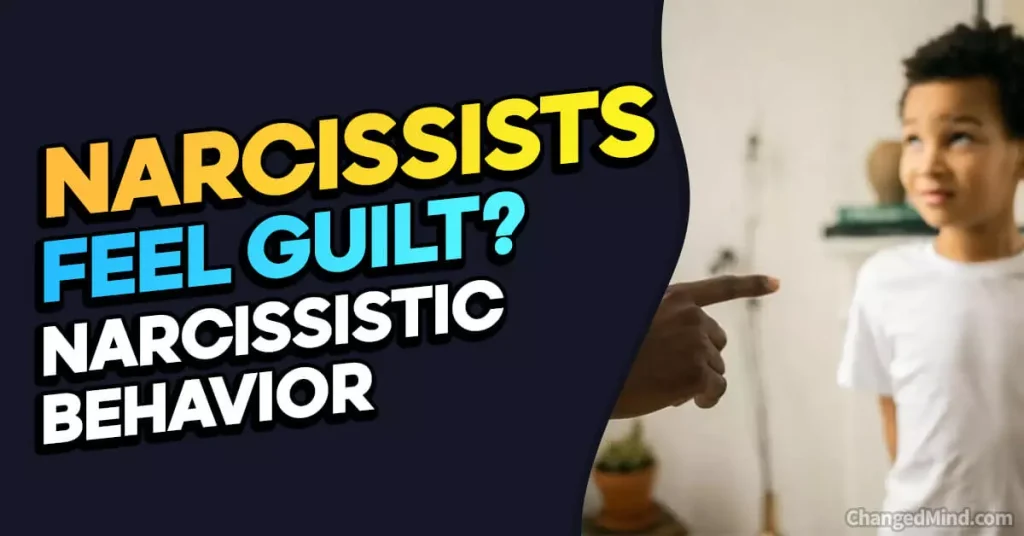
Ah, relationships—the rollercoaster rides of love, laughter, and occasionally, utter chaos. But when you add narcissism into the mix, things can take a treacherous turn. Buckle up, because we’re about to explore the impact of narcissistic behavior on relationships.
Toxic Relationship Dynamics: Emotional Abuse and Manipulation
Narcissists are experts at creating toxic relationship dynamics that can leave you feeling like you’re walking on emotional eggshells. Their manipulative tendencies and lack of empathy can result in emotional abuse that slowly chips away at your self-worth and mental well-being. It’s like a never-ending game of emotional tug-of-war, where they hold all the ropes and you’re left tangled in their web of deceit.
They’ll gaslight you, making you question your reality and sanity. They’ll devalue and belittle you to maintain their own inflated sense of superiority. They’ll exploit your vulnerabilities, emotions, and strengths to control and manipulate you. It’s like being caught in a hurricane of emotional turmoil, with the narcissist at the eye of the storm.
Power Imbalances and Emotional Rollercoasters
Narcissists thrive on power imbalances within relationships. They need to feel superior and maintain control at all costs. This power dynamic can leave you feeling powerless, insignificant, and constantly walking on eggshells. It’s like they’re the conductor of a twisted emotional orchestra, playing your heartstrings like a maestro gone mad.
In these relationships, your feelings, needs, and desires often take a backseat to the narcissist’s insatiable appetite for attention and validation. Your thoughts and opinions become insignificant whispers in the roaring storm of their ego. It’s like being the supporting actor in a never-ending play where the narcissist is always the star.
Recognizing and Addressing Patterns for Personal Well-Being
Recognizing the impact of narcissistic behavior on your relationship is a crucial step toward reclaiming your personal well-being. Here are a few important things to keep in mind:
- Educate Yourself: Understanding narcissism and its effects on relationships empowers you to recognize the patterns of manipulation, gaslighting, and emotional abuse. Knowledge is power, my friend.
- Set Boundaries: Establish clear boundaries to protect yourself from further emotional harm. Communicate your needs, expectations, and limits. Remember, you have the right to be treated with respect and kindness.
- Seek Support: Reach out to trusted friends, family members, or professionals who can provide emotional support and guidance. Connecting with others who have experienced similar situations can be incredibly validating and empowering.
- Prioritize Self-Care: Take care of yourself, both physically and emotionally. Engage in activities that bring you joy, practice self-compassion, and seek out therapies or practices that promote healing and growth.
- Consider Professional Help: If the impact of the narcissistic relationship becomes overwhelming, don’t hesitate to seek professional help. Therapists experienced in dealing with narcissistic abuse can provide invaluable guidance and support on your journey to recovery.
Remember, you deserve to be in a relationship built on trust, respect, and mutual empathy. Don’t settle for anything less.
In the next section, we’ll explore the strategies for coping with guiltless narcissists and regaining your power within toxic relationships. Get ready to take back the control and rock your own world!
What Emotions Do Narcissists Feel?
Narcissists, with their self-centered nature, tend to experience a limited range of emotions. While they may not exhibit genuine guilt, it’s essential to understand the emotions that are commonly associated with narcissistic individuals.
Grandiose Narcissists
Grandiose narcissists, characterized by their inflated sense of self-importance, often display emotions such as:
- Pride: They take immense pleasure in their achievements, seeking constant admiration and recognition.
- Anger: When their superiority is challenged or they feel criticized, grandiose narcissists can become easily angered.
- Jealousy: They struggle with envy when others receive attention or recognition they believe should be directed at them.
Vulnerable Narcissists
Vulnerable narcissists, on the other hand, exhibit more fragile self-esteem and may experience emotions such as:
- Shame: They are highly sensitive to criticism and may feel deep shame when they perceive themselves as failures or inadequate.
- Fear: Vulnerable narcissists often harbor intense fears of rejection, abandonment, or being exposed as frauds.
- Anxiety: Their need for constant validation can lead to anxiety when they fear not meeting their own or others’ expectations.
Do Narcissists Feel Emotional Pain?
While narcissists may not experience emotions like guilt or empathy, they are not entirely immune to emotional pain. However, their response to pain differs from that of non-narcissistic individuals. Instead of reflecting on their actions or seeking personal growth, narcissists tend to respond with defensive mechanisms such as:
- Blame-Shifting: They may redirect blame onto others or external circumstances to avoid taking responsibility for their actions.
- Projecting: Narcissists project their own insecurities or negative traits onto others as a way to maintain their self-perceived superiority.
- Invalidation: They may invalidate or dismiss the emotions and experiences of those around them, minimizing their own role in causing emotional pain.
Understanding the emotional landscape of narcissists can help you navigate relationships with them more effectively and make informed decisions about your own well-being. Remember, seeking support and setting boundaries are crucial when dealing with narcissistic individuals.
Do Narcissists Feel Shame?
While guilt and shame are distinct emotions, it’s worth exploring whether narcissists experience shame, which is closely related to guilt. Let’s delve into the topic and consider whether it’s possible to make a narcissist feel shame.
Understanding Shame in Narcissists
Shame is a complex emotion that involves a deep sense of personal inadequacy or unworthiness. It arises when individuals perceive a significant flaw or failing within themselves. In the case of narcissists, their inflated self-image and grandiosity act as protective shields against feelings of shame. They often project an exaggerated sense of self-importance and superiority to mask their underlying insecurities.
Can You Make a Narcissist Feel Shame?
Attempting to make a narcissist feel shame is a challenging task. Their defenses are well-established, and they go to great lengths to avoid confronting their own flaws or shortcomings. Rather than experiencing genuine shame, narcissists are more likely to respond defensively or redirect blame onto others. Their primary concern is maintaining their facade of perfection and superiority.
It’s important to note that trying to make a narcissist feel shame can be emotionally draining and counterproductive. It is more effective to focus on your own well-being and establish healthy boundaries in your interactions with them.
Strategies for Dealing with Narcissistic Behavior
When dealing with narcissistic individuals, consider the following strategies:
- Set boundaries: Establish clear boundaries to protect yourself from their manipulative behavior and maintain your emotional well-being.
- Practice self-care: Prioritize self-care activities that nurture your mental and emotional health, such as engaging in hobbies, seeking support from loved ones, and practicing mindfulness or meditation.
- Seek professional help: If you find yourself deeply affected by the relationship or struggling to cope, consider seeking therapy or counseling. A qualified professional can provide guidance tailored to your specific situation.
- Educate yourself: Learn more about narcissism and its impact on relationships. Understanding their behavior can help you navigate the dynamics more effectively.
Remember, it’s not your responsibility to change or fix a narcissist. Focus on taking care of yourself and surrounding yourself with positive and supportive people who appreciate and value you for who you are.
Do Narcissists Feel Guilt and Remorse?
As much as we’d hope for narcissists to experience guilt and remorse for their actions, the truth is that their capacity for these emotions is severely limited. Let’s delve into the reasons behind their lack of guilt and explore whether it’s possible to make a narcissist feel guilty.
Do Narcissists Feel Guilty about Their Actions?
Narcissists typically struggle to feel genuine guilt about their actions. Their impaired empathy and self-centered nature make it challenging for them to understand or recognize the impact of their behavior on others. Instead, they often rationalize or justify their actions to protect their fragile self-image. This lack of guilt can contribute to the toxic dynamics of their relationships, where they prioritize their own needs and manipulate others for personal gain.
Can a Narcissist Have a Guilty Conscience?
A guilty conscience requires self-reflection, empathy, and the ability to recognize and take responsibility for one’s wrongdoing. Unfortunately, these traits are generally lacking in narcissistic individuals. While they may mimic guilt to manipulate or control others, it’s unlikely to be an authentic emotional experience for them. Narcissists are driven by self-preservation, often prioritizing their own desires above the well-being of others.
How to Make a Narcissist Feel Guilty?
Attempting to make a narcissist feel guilty can be a challenging endeavor. Their defensive mechanisms and lack of empathy make it difficult for them to truly internalize feelings of guilt. Moreover, focusing on making them feel guilty can divert attention from your own well-being. It’s important to prioritize your own emotional health and set boundaries to protect yourself from the manipulative tactics of narcissists.
Instead of trying to make a narcissist feel guilty, consider the following strategies:
- Set boundaries: Establish clear boundaries to protect yourself from their manipulative behavior.
- Seek support: Reach out to trusted friends, family, or professionals who can provide guidance and understanding.
- Focus on self-care: Prioritize your own well-being by engaging in activities that bring you joy, practicing self-compassion, and seeking therapy if needed.
- Limit contact: Minimize your exposure to toxic relationships with narcissists, as prolonged interactions can be detrimental to your emotional health.
Remember, you cannot change a narcissist, but you can take control of your own life and well-being. By focusing on self-care and creating healthier relationships, you can cultivate a happier and more fulfilling future.
Exploring the Concept of Guilt
Definition and Psychological Significance of Guilt
Guilt, my friend, is like a pesky little voice in your head that reminds you when you’ve done something that doesn’t align with your moral compass. It’s an emotional response to having violated your own moral or ethical standards. Guilt is like the superhero sidekick that swoops in when you need a reality check.
But here’s the cool part: guilt serves a purpose beyond making you feel a tad uncomfortable. It actually promotes prosocial behavior and fosters empathy. It’s like a superhero cape that transforms you into a better version of yourself.
The Role of Guilt in Promoting Prosocial Behavior and Fostering Empathy
When you experience genuine guilt, it’s like a signal that you’ve crossed a line and need to course-correct. Guilt prompts you to reflect on your actions, evaluate the impact they’ve had on others, and motivates you to make amends or change your behavior. It’s like your personal ethical alarm system, keeping you on the path of righteousness.
But wait, there’s more! Guilt also plays a crucial role in fostering empathy. When you feel guilty, it opens the door to understanding the emotional experience of others. It’s like a secret passage that leads to deeper connections and compassion.
Imagine this scenario: You accidentally break your friend’s favorite vase. Genuine guilt kicks in, making you empathize with their disappointment and frustration. It’s like stepping into their shoes and feeling the weight of their emotions. This newfound empathy not only drives you to apologize and make amends but also strengthens your bond with your friend. It’s like a superhero duo fighting the forces of emotional distance.
So, embrace guilt as a force for good. It’s not there to punish you but to guide you towards better choices, deeper connections, and a more empathetic outlook on life.
Emotional Experience of Guilt for Non-Narcissistic Individuals
Alright, let’s dive into the emotional realm of guilt. For those of us who don’t have a one-way ticket to the land of narcissism, guilt plays a vital role in our emotional landscape. It’s like a little nudge that pushes us toward personal growth and better relationships.
A Mechanism for Introspection, Remorse, and Personal Growth
Guilt is a powerful mechanism for introspection—it’s like shining a spotlight on our actions and forcing us to evaluate their moral implications. When you experience genuine guilt, it’s a sign that you recognize your behavior as going against your values or ethical standards. It’s like a personal wake-up call, telling you, “Hey, you might want to reconsider your choices there.”
Here’s where it gets interesting: guilt often brings along its friends, remorse and personal growth. When you feel genuine guilt, you’re more likely to experience remorse for your actions. It’s like a cocktail of emotions that pushes you to make things right and learn from your mistakes.
Examples of Guilt Prompting Apologies, Amends, and Behavior Change
Let’s sprinkle in some real-life examples to illustrate the power of guilt in action:
- The Apology Note: Imagine you accidentally forgot about a friend’s important event. When you realize your mistake, guilt swoops in. You swiftly pen a heartfelt apology note, expressing your remorse for letting them down. It’s like a written vow to do better next time.
- The Amends Journey: Picture this—you unintentionally borrowed a book from a colleague and forgot to return it. Guilt taps on your shoulder, urging you to make things right. You seek them out, apologize, and return the book along with a heartfelt gesture. It’s like a small act of kindness that repairs the bond.
- The Behavior Shift: Let’s say you catch yourself gossiping about a coworker. Suddenly, guilt smacks you in the face. You reflect on your actions, realizing they go against your values of kindness and integrity. Guilt fuels a behavior shift—you actively make an effort to refrain from engaging in gossip and instead promote a supportive work environment. It’s like a personal growth spurt that strengthens your character.
So, embrace the power of guilt, my friend. It’s not just a nagging feeling; it’s a catalyst for introspection, remorse, and personal growth. Use it wisely, and let it guide you toward becoming the best version of yourself.
Addressing Common Misconceptions about Narcissistic Guilt
Ah, narcissistic guilt—a puzzling concept that often leaves people scratching their heads. Let’s clear the air and debunk some common misconceptions surrounding the elusive guilt in narcissists.
Impaired Capacity for Empathy and Self-Reflection
Here’s the cold, hard truth: narcissists have a general lack of genuine guilt. But why is that? Well, it all comes down to their impaired capacity for empathy and self-reflection. Empathy is like an emotional superpower—it allows us to understand and share the feelings of others. Unfortunately, narcissists seem to have misplaced their empathy cape, leaving them bereft of this essential trait.
Without empathy, narcissists struggle to grasp the emotional experiences of those around them. They’re too consumed by their own needs and desires to truly connect with others on an empathetic level. It’s like they’re stuck in a self-centered bubble, and the rest of us are waving from outside, hoping they’ll notice.
Feigning Guilt for Manipulation
Now, here’s where things get a bit tricky. While narcissists may not experience genuine guilt, they can certainly put on a show for the sake of manipulation. It’s like they’re playing a never-ending game of emotional charades, pretending to feel something they don’t.
Why do they do this? Well, narcissists are master manipulators. They use various tactics to control and exploit others, and feigning guilt is just another card in their deck. By pretending to feel guilt, they can manipulate your emotions, gain sympathy, and keep you under their influence. It’s like they’ve studied the art of emotional deception and are performing a grand illusion.
But remember, their display of guilt is typically not an authentic emotional experience. It’s a calculated move to serve their own agenda. So, don’t be fooled by their theatrics.
Understanding these misconceptions is crucial when dealing with narcissists. It helps you protect yourself from falling into their manipulation traps and sets realistic expectations for their emotional capacity.
Do Narcissists Experience Guilt?
Ah, the burning question: Do narcissists experience guilt? Let’s delve into the depths of research and studies to uncover the truth behind the absence of guilt in these self-absorbed individuals.
Examination of the Lack of Empathy in Narcissists
Research and studies have consistently shown that narcissists have reduced empathetic responses to the emotions of others. It’s like they have an empathy chip missing from their emotional circuitry. The empathy radar just doesn’t seem to register on their self-centered screens.
When you combine their impaired capacity for empathy with guilt, things become even clearer. Empathy is the gateway to understanding and sharing the emotions of others. Without it, narcissists struggle to grasp the emotional consequences of their actions, leaving little room for genuine guilt to enter the picture.
Factors Contributing to the Absence of Guilt in Narcissists
But wait, there’s more! It’s not just their lack of empathy that keeps guilt at bay. Narcissists have a cocktail of cognitive distortions swirling around in their minds that contribute to their guilt-free existence.
Their sense of entitlement, fueled by a belief in their own superiority, forms a barrier against guilt. It’s like they have a personal forcefield protecting them from any pangs of remorse. And let’s not forget their self-centered worldview and emotional detachment, which further diminish any capacity for guilt. It’s like they’re living in their own narcissistic bubble, and guilt is the air they don’t breathe.
Research Findings and Studies on Narcissistic Guilt
The evidence is clear: studies consistently reveal the absence of guilt in narcissistic behavior. These studies shine a light on the emotional responses of narcissists, highlighting their consistent lack of guilt and remorse. It’s like an open book revealing the pages of a guilt-free script.
Understanding these research findings is crucial for navigating relationships with narcissistic individuals. It sets realistic expectations and helps you recognize the limitations of their emotional capacity. By acknowledging their lack of guilt, you can protect yourself from falling into a guilt-trap and focus on your own emotional well-being.
Signs of Guilt in Narcissistic Behavior
Ah, the twisted world of narcissistic behavior. Brace yourself as we uncover the cunning tactics that narcissists employ, sometimes masquerading as guilt. But fear not! We’re here to help you differentiate between the real deal and their manipulative tricks.
Observable Behaviors That Might Be Mistaken for Guilt
Narcissists have a knack for putting on a show, and guilt is no exception. At first glance, you might think they’re experiencing genuine remorse. They might offer apologies, promise to change their ways, or even shed a tear or two. It’s like they’ve taken a crash course in “Guilt Acting 101.”
But here’s the twist: these behaviors are often superficial and manipulative. They’re not genuine expressions of guilt, but rather calculated moves to keep you ensnared in their web. It’s like they’re playing a game of emotional chess, moving the pieces to suit their agenda.
Differentiating Guilt from Other Manipulative Tactics
To navigate the labyrinth of narcissistic behavior, you must become a master detective, equipped with the skills to spot their manipulation tactics. It’s like you’re Sherlock Holmes, unraveling their web of deceit. Look out for these red flags:
- Love-bombing: Narcissists may shower you with affection, gifts, and grand gestures to reel you in. It’s like they’re putting on a romantic fireworks show, dazzling you with their charm. But remember, love-bombing is not genuine guilt—it’s a tactic to manipulate your emotions and gain control.
- Gaslighting: Brace yourself for the mind-bending world of gaslighting. Narcissists may twist reality, make you doubt your own perceptions, and question your sanity. It’s like they’re playing with your mind, rearranging the furniture of your thoughts. Guilt is not their game—it’s all about maintaining control.
- Playing the Victim: Ah, the victim card—a classic move in the narcissist’s playbook. They may portray themselves as the poor, wounded soul, blaming others for their actions. It’s like a Shakespearean tragedy, with them cast as the tragic hero. But make no mistake, this isn’t guilt—it’s a manipulative ploy to avoid responsibility.
Case Studies and Examples of Narcissistic Guilt Avoidance
To shed further light on narcissistic guilt avoidance, let’s explore some real-life examples or hypothetical scenarios. Picture this:
- Sophie, a narcissistic individual, is caught in a lie. Instead of owning up to her deception, she shifts the blame onto others, painting herself as the innocent victim of circumstances. Guilt? Nowhere to be found.
- David, another narcissist, avoids guilt by employing deflection tactics. When confronted about his hurtful actions, he swiftly changes the subject or brings up past grievances. Guilt is simply not on his emotional radar.
The long-term effects of these behaviors can be devastating for their victims. Emotional turmoil, self-doubt, and a sense of powerlessness can take their toll. Recognizing these patterns is the first step toward regaining control and protecting your well-being.
In the next section, we’ll equip you with practical strategies for dealing with narcissistic guilt avoidance and setting healthy boundaries. Get ready to unleash your inner superhero and reclaim your power!
Implications for Toxic Relationships
In the treacherous realm of toxic relationships, the absence of guilt in narcissists can have far-reaching implications. Brace yourself as we uncover the impact of guiltlessness on these dysfunctional dynamics and explore strategies for navigating these tumultuous waters.
The Impact of Guiltlessness on Toxic Relationships
Picture a vicious cycle—a never-ending dance of abuse and manipulation. The absence of guilt in narcissists perpetuates this toxic cycle. Without the burden of remorse, they continue to exploit, deceive, and harm their partners. It’s like a never-ending game of emotional chess, and you’re left feeling like a pawn in their grand strategy.
The emotional toll on victims of toxic relationships cannot be underestimated. Feelings of worthlessness, confusion, and self-doubt can consume your every thought. It’s like you’re caught in a whirlwind of emotional chaos, desperately seeking stability and validation.
Emotional Manipulation and Power Imbalances
Guiltlessness grants narcissists a powerful tool—emotional manipulation. They have an uncanny ability to exploit your vulnerabilities, playing with your emotions like a skilled puppeteer. It’s like they hold the remote control to your heart and soul.
Through emotional manipulation, narcissists establish power imbalances within the relationship. They thrive on exerting control, leaving you feeling powerless and stripped of your autonomy. It’s like a one-sided tug-of-war, with them firmly gripping the rope of dominance.
Strategies for Coping with Guiltless Narcissists
So, how can you navigate the stormy seas of a toxic relationship with a guiltless narcissist? Fear not, my friend, for there are strategies to reclaim your power and protect your well-being.
- Set boundaries: Establish clear boundaries and communicate your expectations. It’s like building a fortress to protect yourself from their manipulative advances.
- Seek support: Reach out to trusted friends, family members, or professionals who can provide a listening ear and valuable guidance. It’s like having a safety net to catch you when you feel like you’re falling.
- Consider therapy or counseling: Professional support can be a lifeline in your journey to healing and recovery. Therapists and counselors can help you navigate the complex emotions and develop strategies for resilience. It’s like having a compass to guide you out of the storm.
- Prioritize self-care: Take time for yourself and engage in activities that bring you joy and solace. Nurture your physical, emotional, and mental well-being. It’s like filling up your own cup so you can withstand the storms that come your way.
Remember, healing from the impact of a guiltless narcissist takes time. Surround yourself with a support network, build resilience, and practice self-compassion. You are not alone in this journey.
In the next section, we’ll explore strategies for spotting the red flags of narcissistic behavior early on and protecting yourself from getting entangled in toxic relationships. Get ready to arm yourself with knowledge and forge a path to healthier connections!
Seeking Help and Support
You’ve made it this far, dear reader, and now it’s time to shed the weight of toxic relationships and embark on a journey of healing. In this section, we’ll explore the power of seeking help and support as you navigate the aftermath of a relationship with a guiltless narcissist. Let’s dive in!
Encouraging Readers to Seek Professional Assistance
Therapy or counseling can be an invaluable resource on your path to recovery. These trained professionals are like guides, equipped with the tools to help you heal the emotional wounds caused by toxic relationships. Here are some reasons to consider seeking professional assistance:
- Emotional healing: Therapy provides a safe space to process your emotions, gain clarity, and work through the trauma inflicted by the narcissistic dynamics. It’s like a soothing balm for your wounded soul.
- Validation and understanding: Therapists specializing in narcissistic abuse recovery understand the intricacies of these relationships. They provide validation, support, and guidance as you navigate the complex aftermath. It’s like having a compassionate friend who truly understands your experiences.
To find qualified therapists who specialize in narcissistic abuse recovery, consider reaching out to professional associations, seeking recommendations from trusted sources, or using online directories that provide therapist listings.
Recommendations for Therapy and Support Groups
In your healing journey, different therapeutic approaches can assist you in rebuilding and reclaiming your life. Here are a few recommendations to consider:
- Trauma-focused therapy: This approach focuses on addressing the trauma and its impact on your well-being. It helps you process the emotional wounds, develop coping strategies, and build resilience. It’s like a roadmap to guide you through the healing process.
- Cognitive-behavioral therapy (CBT): CBT helps you identify and challenge negative thought patterns and behaviors that may have developed as a result of the toxic relationship. It equips you with practical tools to reshape your thinking and foster healthier emotional well-being. It’s like a mental gym workout, strengthening your positive mindset.
Support groups and online communities can also play a crucial role in your healing journey. Connecting with individuals who have similar experiences can provide validation, empathy, and a sense of belonging. These communities are like beacons of light, guiding you through the darkness.
Tips for Self-Care and Healing from Toxic Relationships
As you embark on your healing journey, don’t forget the importance of self-care. Here are some practical tips to support your well-being:
- Practice mindfulness: Engage in mindfulness exercises to ground yourself in the present moment, cultivate self-awareness, and promote inner peace. It’s like pressing the reset button for your mind.
- Engage in activities that bring joy: Rediscover the things that make your heart sing. Whether it’s painting, hiking, or dancing in your living room, prioritize activities that ignite your passion and bring you joy. It’s like a joyful escape from the pains of the past.
- Prioritize physical and mental well-being: Nourish your body with nutritious food, prioritize regular exercise, and get enough restful sleep. Additionally, consider incorporating relaxation techniques, such as deep breathing or yoga, to reduce stress and promote inner calm. It’s like creating a sanctuary of well-being for yourself.
Remember, healing is a journey that takes time and patience. Focus on personal growth, practice self-compassion, and build healthier relationship patterns in the future. You have the power to break free from the chains of toxicity and cultivate a life filled with authenticity and genuine connections.
In the final section, we’ll wrap up our exploration by summarizing key takeaways and empowering you with a roadmap for a brighter, healthier future. You’re on the path to reclaiming your power—keep moving forward!
Conclusion
Congratulations, dear reader, for accompanying us on this enlightening journey through the realm of narcissism, guilt, and toxic relationships. Let’s recap the key points we’ve covered and offer some final thoughts to guide you forward.
Recap of Key Points Discussed in the Article
Throughout this article, we’ve explored the intricate world of narcissism and its impact on relationships. Here are the key takeaways:
- Narcissism: We delved into the characteristics of narcissistic personality disorder (NPD), such as grandiosity, manipulative behaviors, and a lack of genuine empathy.
- Guilt in Non-Narcissistic Individuals: We examined the role of guilt as a mechanism for introspection, remorse, and personal growth in healthy individuals, allowing them to make amends and change their behaviors.
- Addressing Misconceptions: We clarified common misconceptions about narcissistic guilt, highlighting the general lack of genuine guilt in narcissists due to their impaired capacity for empathy and self-reflection.
- Implications for Toxic Relationships: We explored how the absence of guilt in narcissists perpetuates toxic relationship dynamics, leading to emotional abuse, manipulation, and power imbalances that can deeply impact the victims.
Final Thoughts on the Question, “Do Narcissists Feel Guilt?”
So, do narcissists truly experience guilt? Based on the extensive research and evidence we’ve examined, the answer is no. While narcissists may occasionally mimic guilt as a manipulative tactic, their impaired empathy and self-centered worldview prevent them from genuinely experiencing this complex emotion.
It’s crucial to understand that their lack of guilt is not a reflection of your worthiness or deservingness of their empathy. It is a characteristic of their disorder, and their manipulative actions should not be internalized as a reflection of your value.
Encouragement for Readers to Prioritize Their Well-being
As we conclude, we want to empower you to prioritize your well-being above all else. Here are some final words of encouragement:
- Seek Support: Reach out to trusted friends, family, or professionals who can provide the support and understanding you need. Consider therapy or counseling to guide you through the healing process.
- Focus on Healing: Take the time and space you need to heal from the emotional wounds inflicted by toxic relationships. Engage in self-care practices, engage in activities that bring you joy, and nurture your physical and mental well-being.
- Create Healthy Boundaries: Set clear boundaries to protect yourself from further harm. Remember, it is your right to prioritize your well-being and surround yourself with healthy, supportive relationships.
- Embrace Growth: Use this experience as an opportunity for personal growth and self-discovery. Cultivate self-compassion, practice forgiveness (for yourself, not the narcissist), and envision a future filled with healthier relationship dynamics.
Remember, dear reader, you are not alone. By recognizing the patterns of narcissistic behavior, understanding the absence of genuine guilt, and prioritizing your well-being, you can break free from the chains of toxic relationships and cultivate a life filled with authenticity, joy, and genuine connections.
It’s time to take the first step on your journey to healing. You deserve love, respect, and happiness. Embrace your inner strength, seek the support you need, and let your spirit soar. You’re on your way to a brighter, healthier future.
FAQ
Can narcissists feel any form of guilt?
While narcissists may feign guilt as a manipulative tactic, they generally lack the capacity for genuine guilt due to their impaired empathy and self-centered nature.
Do narcissists ever apologize or show remorse?
Narcissists may occasionally offer apologies, but they are often insincere and used as a means of maintaining control or manipulating others, rather than expressing genuine remorse.
Can therapy help narcissists develop a sense of guilt?
Therapy can be beneficial for individuals with narcissistic traits, but it is challenging for them to develop genuine guilt. Therapy focuses more on managing behaviors and improving relationships.
Are there any situations that can trigger guilt in narcissists?
In rare cases, narcissists may experience fleeting moments of guilt, usually when their own self-interests or reputation are at stake. However, it is not a consistent or genuine emotional response.
Can narcissists change and develop a capacity for guilt?
While change is possible, it is extremely challenging for narcissists to develop authentic guilt. It requires a deep level of self-reflection, empathy, and a genuine desire to change their behaviors, which is rare.
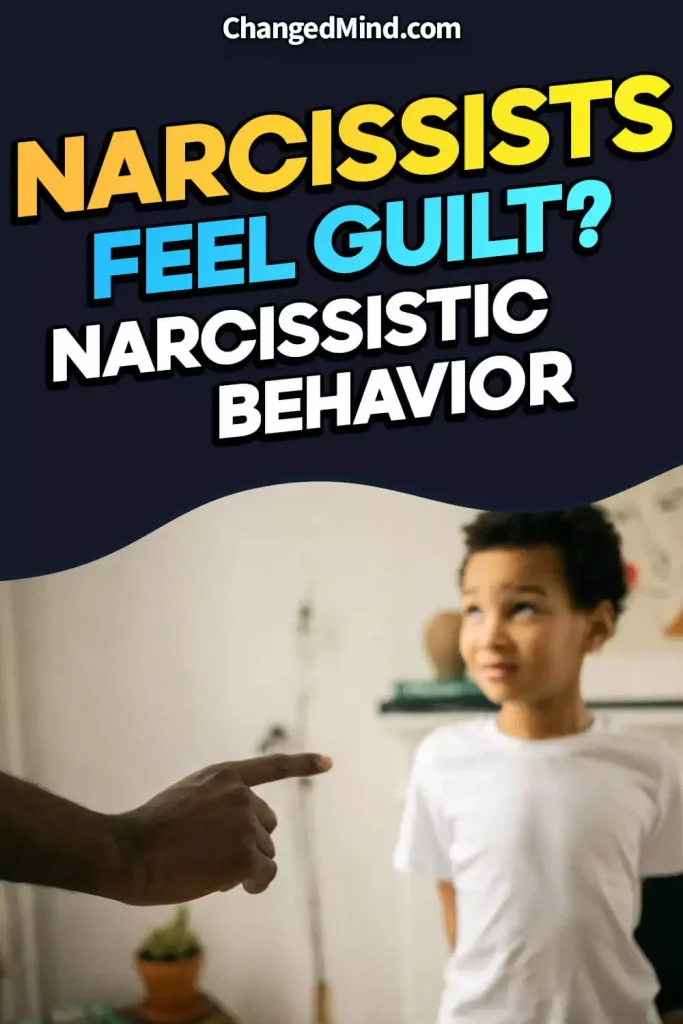
Disclaimer
This information is for educational purposes only and is not intended to be a substitute for clinical care. Please consult a health care provider for guidance specific to your case.


